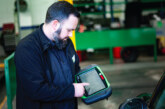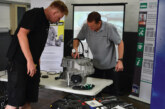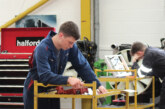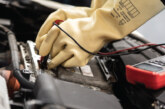Sampling oil correctly and regularly can help highlight potential problems in commercial vehicles before they become serious, says technical expert, Andy Brown, from FUCHS Lubricants.
“When samples are taken over a longer period of time, you can start to trend results and see things like bearing wear, cylinder wear, and coolant contamination.”
Simply sampling an oil can help reduce costs by unearthing issues with a vehicle before it breaks down completely, therefore minimising downtime. But be warned that oil samples must be taken correctly in order to produce the most accurate results.
To help in this process, FUCHS offers the CENT sampling service to its customers, producing clear, precise feedback in the form of graphs and reports, along with suggestions for remedial action. This production management tool indicates wear trends, additive levels and sources of contamination.
In 2016, the company carried out around 27,000 sampling reports from across all industry sectors the company is involved in. Many of those reports were for commercial vehicles.
If you examine the condition of the oil through sampling, you can see problems before they escalate and become bigger issues. Customers send the sample to us and we look at viscosity, additive levels, wear levels, oxidation, and contaminants such as coolant ingress, dirt ingress and soot levels. All of these things can tell us the condition of the oil and the condition of the engine, gearbox or hydraulic system. When samples are taken over a longer period of time, you can start to trend results and see things like bearing wear, cylinder wear, and coolant contamination. For example, if there is a lot of dirt in the oil, maybe the air filter hasn’t been changed, or perhaps there’s a split somewhere in the air in-take system.
It’s a powerful tool because downtime can be so costly. You can spot a problem and replace something for a nominal amount rather than leaving it and having catastrophic problems. Commercial vehicles need to be ready to use when you need them, otherwise you run the risk of materials arriving late or cancelled journeys.
It is, however, absolutely crucial that samples are taken properly. The way sampling is carried out is massively important and it’s the bit that everyone gets wrong. I remember an occasion when a bus company was extremely concerned that its vehicles were generating excess soot out of the exhaust.
We carried out extensive analysis on samples they gave us which confirmed the initial fears and there was a major investigation involving the engine manufacturer, the bus manufacturer and the filter manufacturers. I asked the bus company how it had taken its samples and it had no idea!










